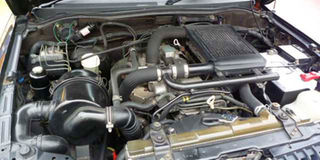Prime
Ask the mechanic: Should I overhaul my engine or not?

A 1996 Mitsubishi Challenger’s 4M40 engine.
Dear Paul, I own a 1996 Mitsubishi Challenger, with a turbo, 4M40 engine. I replaced the crankshaft in January due to an oil leakage in pulley area. The leak stopped but re-occurred elsewhere. There is loss of power going uphill and uneven vibration. The mechanic advised an engine overhaul because there is “too much pressure inside due to age”. Should I do it? Thanks. Peter.
Hello Peter, I appreciate your keenness to restore the engine. I recognise three concerns you have raised. First, the persistent oil leakage. Second, engine power loss driving uphill and whether an overhaul is necessary. Third, the unusual engine to body vibration.
Often engine oil leaks are caused by worn-out or damaged seals around the engine. Aged seals are warped by engine heat or the use of engine oil, which is not designed with properties to protect ageing seals.
In your case, the first oil leak around the front engine pulley must have been caused by a damaged front crankshaft seal. I wonder why that led to the more expensive crank shaft replacement. Other potential leaking seals are at: the rear crankshaft, engine valve cover, lower crank case (oil sump), turbo charger, exhaust manifold.
While it doesn’t take an engine overhaul to fix these leaks, during the overhaul, the gasket and seal kit will have all the seals necessary to plug these leaks.
Loss of power can be caused by a faulty fuel system; malfunctioning turbo charger or poor engine compression. A faulty fuel system can lead to power loss when injectors clogged by accumulated deposits fail to deliver the appropriate fuel pressure for atomisation and prompt combustion.
The fuel pressure can be curtailed by a faulty injector pump. In both cases, a specialist will test and service the injector nozzles and injector pump using a special test bench to calibrate them to meet the required fuel delivery pressure. The fuel lines must be inspected for leaks and the fuel filter replaced.
Loss of engine power could be a result of poor engine compression. Engine compression is simply mechanical energy from ratio of fuel and air mixture. This energy helps to push the pistons during the combustion cycle.
Reduced engine compression can lead to loss of engine power when the fuel-air mixture under high pressure escapes past damaged piston rings along the cylinder walls into the crank case.
Carbon deposits on intake valves and valve seats could allow the blow by air to escape past the valves. This also reduces engine compression as it leads to misfire and loss of power especially to a diesel engine, which relies on compression ignition of fuel and air at high pressure. Perhaps, this is what your mechanic means by “the engine has too much pressure inside due to age”.
A test of each cylinder with a suitable kit will detect a leak and determine if there is damage of piston rings, worn-out valve seals or dirty intake valves (seats) to warrant an overhaul.
When the necessary repairs are carried out and your engine restored, regularly use diesel fuel and engine oil with cleaning additives to prevent deposit and sludge formation, which leads to damage of pistons and intake valves.
send sms: mycar (space) your comments and questions to 6933,
or email them to [email protected]
By Paul Kaganzi (0772316145)




